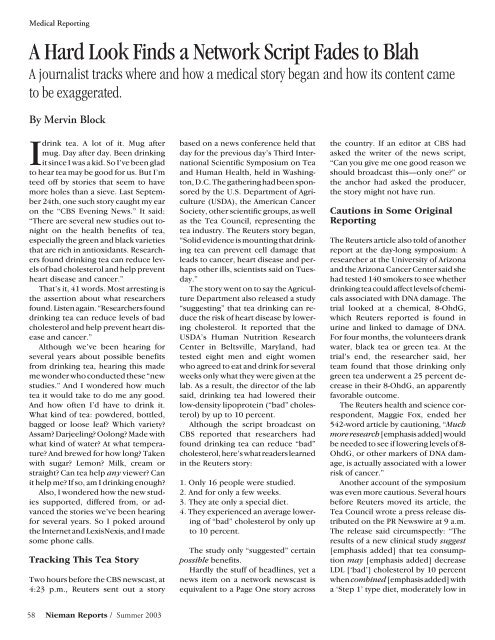summer-2003-Part 2-live - Nieman Foundation - Harvard University
summer-2003-Part 2-live - Nieman Foundation - Harvard University
summer-2003-Part 2-live - Nieman Foundation - Harvard University
- No tags were found...
You also want an ePaper? Increase the reach of your titles
YUMPU automatically turns print PDFs into web optimized ePapers that Google loves.
Medical ReportingA Hard Look Finds a Network Script Fades to BlahA journalist tracks where and how a medical story began and how its content cameto be exaggerated.By Mervin BlockIdrink tea. A lot of it. Mug aftermug. Day after day. Been drinkingit since I was a kid. So I’ve been gladto hear tea may be good for us. But I’mteed off by stories that seem to havemore holes than a sieve. Last September24th, one such story caught my earon the “CBS Evening News.” It said:“There are several new studies out tonighton the health benefits of tea,especially the green and black varietiesthat are rich in antioxidants. Researchersfound drinking tea can reduce levelsof bad cholesterol and help preventheart disease and cancer.”That’s it, 41 words. Most arresting isthe assertion about what researchersfound. Listen again. “Researchers founddrinking tea can reduce levels of badcholesterol and help prevent heart diseaseand cancer.”Although we’ve been hearing forseveral years about possible benefitsfrom drinking tea, hearing this mademe wonder who conducted these “newstudies.” And I wondered how muchtea it would take to do me any good.And how often I’d have to drink it.What kind of tea: powdered, bottled,bagged or loose leaf? Which variety?Assam? Darjeeling? Oolong? Made withwhat kind of water? At what temperature?And brewed for how long? Takenwith sugar? Lemon? Milk, cream orstraight? Can tea help any viewer? Canit help me? If so, am I drinking enough?Also, I wondered how the new studiessupported, differed from, or advancedthe stories we’ve been hearingfor several years. So I poked aroundthe Internet and LexisNexis, and I madesome phone calls.Tracking This Tea StoryTwo hours before the CBS newscast, at4:23 p.m., Reuters sent out a storybased on a news conference held thatday for the previous day’s Third InternationalScientific Symposium on Teaand Human Health, held in Washington,D.C. The gathering had been sponsoredby the U.S. Department of Agriculture(USDA), the American CancerSociety, other scientific groups, as wellas the Tea Council, representing thetea industry. The Reuters story began,“Solid evidence is mounting that drinkingtea can prevent cell damage thatleads to cancer, heart disease and perhapsother ills, scientists said on Tuesday.”The story went on to say the AgricultureDepartment also released a study“suggesting” that tea drinking can reducethe risk of heart disease by loweringcholesterol. It reported that theUSDA’s Human Nutrition ResearchCenter in Beltsville, Maryland, hadtested eight men and eight womenwho agreed to eat and drink for severalweeks only what they were given at thelab. As a result, the director of the labsaid, drinking tea had lowered theirlow-density lipoprotein (“bad” cholesterol)by up to 10 percent.Although the script broadcast onCBS reported that researchers hadfound drinking tea can reduce “bad”cholesterol, here’s what readers learnedin the Reuters story:1. Only 16 people were studied.2. And for only a few weeks.3. They ate only a special diet.4. They experienced an average loweringof “bad” cholesterol by only upto 10 percent.The study only “suggested” certainpossible benefits.Hardly the stuff of headlines, yet anews item on a network newscast isequivalent to a Page One story acrossthe country. If an editor at CBS hadasked the writer of the news script,“Can you give me one good reason weshould broadcast this—only one?” orthe anchor had asked the producer,the story might not have run.Cautions in Some OriginalReportingThe Reuters article also told of anotherreport at the day-long symposium: Aresearcher at the <strong>University</strong> of Arizonaand the Arizona Cancer Center said shehad tested 140 smokers to see whetherdrinking tea could affect levels of chemicalsassociated with DNA damage. Thetrial looked at a chemical, 8-OhdG,which Reuters reported is found inurine and linked to damage of DNA.For four months, the volunteers drankwater, black tea or green tea. At thetrial’s end, the researcher said, herteam found that those drinking onlygreen tea underwent a 25 percent decreasein their 8-OhdG, an apparentlyfavorable outcome.The Reuters health and science correspondent,Maggie Fox, ended her542-word article by cautioning, “Muchmore research [emphasis added] wouldbe needed to see if lowering levels of 8-OhdG, or other markers of DNA damage,is actually associated with a lowerrisk of cancer.”Another account of the symposiumwas even more cautious. Several hoursbefore Reuters moved its article, theTea Council wrote a press release distributedon the PR Newswire at 9 a.m.The release said circumspectly: “Theresults of a new clinical study suggest[emphasis added] that tea consumptionmay [emphasis added] decreaseLDL [‘bad’] cholesterol by 10 percentwhen combined [emphasis added] witha ‘Step 1’ type diet, moderately low in58 <strong>Nieman</strong> Reports / Summer <strong>2003</strong>
















